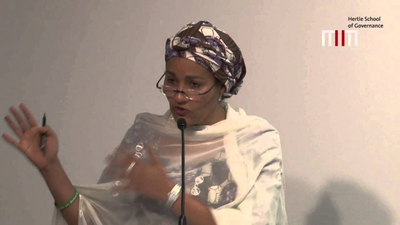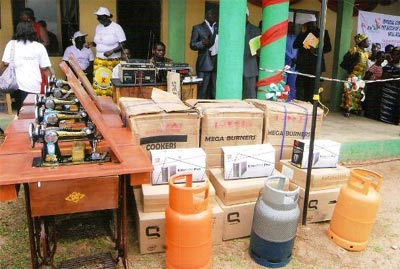Governance and the Institutional Framework of Development Management in Africa: Reversing the Decline in Quality Delivery – The Institutional Framework of Development Management
As I stated in an earlier blog post , development management, in scholarly and practical perspectives, serves as a tool for executing institutional agendas within the measure of planning, implementation and monitoring of development oriented programmes. Governments and the public service generate policies, provide research based analysis of development situations, introduce and monitor corresponding projects in development at every level of decisions – international, regional, national or local.
Studies into the typology and versatility of the term reveals that a good or bad development programme depends largely on the quality of the institution through which actions are channelled. Derick and Jennifer Brinkerhoff (2005) in their analysis of the process and definitions of development management saw multilateral organisations such as the United Nations, and International Non-Governmental Organizations (NGOs) as examples of institutions. They remarked that in the attempt to achieve results institutions may sometimes find their agendas overriding even the real needs of the local populace, towards whose welfare developments actions are being planned in the first place. It is worthy of note however that those development institutions alike, despite espousing policies regarding country participation and adaptation to local priorities and needs, share a common set of principles and objectives. Most donor policy frameworks incorporate a combination of market liberalisation, privatisation, state downsizing, democratic governance, equitable delivery of basic services, and poverty reduction. They take a comprehensive approach to country-level planning [1]
Although Cooke (2003) who took a more radical position on the issue in the context of developing countries, argued that the institutional agenda facet of development management reveals a connection to the imperialist agendas of colonialism, and that today’s development management is the instrument of donor-imposed priorities just as colonial administration enabled Western imperialists to rule their acquired territories for their own purposes[2], the country level planning follows the need for local participation which is considered indispensable as the turning point from the one-size-fits-all approach of external development agencies in order to allow for the best local adaptations of programmes which will meet the need of the population without working against the indigenous cultural and traditional traits as well as the natural mode and rhythm of development[3].
Country-Level Implication and the Africa Specifics
In the light of the above analysis, the participation of Governments and the civil service platform in the interior of a country remains very crucial in the carriage of development management. Of a truth, international NGOs and intergovernmental organizations help government achieve development goals in technical support or even field assistance, the proper planning of the economy as well as assistance in underground studies of local situations, statistical analysis and provisions is mostly ensured by main stream ministries such as education, development, environment and culture, etc. Apart from the technical services, public institutions render, they are also the ones that manage the spending of official development assistance funds provided for states.
In most African states, government co-operations are major providers of basic infrastructures and amenities which ensures smooth running of the economy, social cohesion and minimum welfare of the populace. This is in part due to the fact that shortly after the decolonization of many Sub-Saharan African States, the question of nationalization of co-operations and infrastructure producing enterprises as a measure to economic growth was the order of the day[4]. At that period, there was faith in public institutions at the expense of the private sector, believed to be instruments of colonial masteries.
Fresh indigenous governments in many of the states feared continuous colonial intervention and therefore pushed for nationalization. Since then, the force that drove development administration, provision of amenities and infrastructural construction has been concentrated on the states and today, the push for privatization has become another major challenge for the developing countries of Africa, due to the mass failure recorded by governments’ agencies in meeting up with the growing complexity of development administration and management. The fact that governments and politics have disappointed with the display of inefficiency and lack of commitment to the common good cannot be overemphasised in the present Africa’s predicament.
The question of woeful economic and social development performance began to come in the limelight about the late 1970s[5] in Africa. Successive military coups in countries like Nigeria, the dictatorship administration in Uganda and the Congo were the first signs of political breakdown, to be followed by the massive economic depression in the 80s.
Within three decades of self-governance in Africa, a continent that showed enormous promises in respect of its natural resource endowment began to manifest symptoms of suffering in the midst of plenty. This prompted attempts of the international community to begin to find solutions to the endemic economic and social development breakdown, leading to the introduction of programmes like the Structural Adjustment Programmes. The Organization for African Unity (OAU) shortly after its creation has been spearheading many initiatives for Africa’s economic and social development.
Many initiatives were taken and introduced in these countries[6] , but it seemed that the problems continued to escalate. This is needless to say that actions have not been lacking as far as African development strategies are concerned but the difficulty remained how the institutions who are supposed to implement initiatives go about it.
The Decline in Delivery
What initially caught attention was the obvious lack of seriousness depicted by apparent inefficiency, as well as the incomprehension generated by the disappearance of funds destined for development purposes within the government public service. Early researches into the deadlock of economic and social development were therefore focused on capacity building and transfer of technical know-how to indigenous practitioners of development especially by the multilateral development and banking institutions. But lately, soon after the apparent failure of the structural adjustment Programme whose major fault was the neglect of local factors in the planning of development policies for states, a more serious attention began to draw into the functioning of the political and public institutions in Africa.
At present the effect of bad political and public service institutions in Africa reflects in the achievements recorded so far in the context of the deadline of achieving the MDGs and the implementation of the sustainable development principles in the national policy strategies in Africa.
2015 marks the deadline for the United Nations on the Millennium development Goals (MDGs). The final review points to the fact that many Sub-Saharan Africa states are yet to achieve many of goals[7]. Progress in the reduction of poverty and hunger was relatively slow under the programme, and, although the proportion of people living in less than one dollar a day or less declined from 45.9 per cent to 41.1 per cent since 1999, reaching the MDG target of halving the extent of extreme poverty still require that the current pace is nearly doubled. The situation is almost the same story as it concerns the goal on education, gender equality, Child mortality, maternal health, AIDS/HIV and other diseases reduction and environmental sustainability, where relatively fairly little progress have been made[8].
By September this year, a new set of Sustainable Development Goals (SDGs) will replace the MDGs as the driving force for advancing global development for the next fifteen years. In the policy process leading to the SDGs; discussions on the Africa’s slow progress have continued to identify institutional inefficiencies and lack of political coordination and corruption as hindrance to the proper transformation of the sustainable development to the good use of national policies and by extension, impacts on the populace.
This buttresses the fact that institutions in Africa since colonization have witnessed constant and progressive deterioration. As at late 1980’s the primary aim of political and public institutions were close to being totally defeated[9]. Institutions that are supposed to be the catalyst for development now constitute a stumbling block for the smooth carriage of the same development.
Moving Forward – Africa Does Not Need Strong Men but Strong Institutions
The words of President Obama on his visits to Africa provide an insight to what is best for Africa in this era. There is no doubt that Africa is already blessed with talented individuals with innovative ideas. But the present of weak and porous institutional frameworks has continued to prevent the proper harmonization of the human energy to yield positive development results.
The question then remains, how would strong Institutions be rebuilt in Africa? The World Bank, one of the Global institutions that has a strong track records in governance and public sector reforms assistance[10], elaborated the strategy for Africa in its November 2000 Publication titled “Reforming Public Institutions and Strengthening Governance”. Although there has been progressive improvement on the situation to date, the underlying principles in the publication are still relevant to the work of improving the public sector and governance. The main approach is to fostering selectivity and strategic Prioritization in:
- Reforming the structure of the state,
- Strengthening public sector management,
- Working from the demand-side, and
- Empowering communities for service delivery.
In summary, the approach recommends strengthening the political process and the structure of governance as well as management in the public sector, through continuous innovation. Some of the actions identified at that time have remained the hallmarks of the reform process that is believed to remain relevant. They include:
- initiating anticorruption activities within civil society and government to raise awareness and mobilize support for reform;
- collaborating with influential groups, such as parliamentarians and the business community, to bring pressure to bear for enhanced accountability and transparency within the operations of government and at the interface between government on the one hand and civil society and the private sector on the other;
- working with foreign investors and others to strengthen the regulatory and dispute-resolution mechanisms for private investors, notably including the enabling environment for private participation in the provision of infrastructure; and
- encouraging changes in political attitudes and behaviour through the provision of seminars, study tours and other catalytic activities designed to make governments aware of the positive outcomes of reform in terms of service provision, growth, equity and political stability.[11]
Clean the Channel and the Product Becomes Good – Institutions free of corruption and inefficiency does it!
To conclude, I would like to tress on the fact that as democracy is gradually finding its way into Africa and hopes are rising that more countries are gaining in democratic dividends and stability, the major task in combating stagnation in quality delivery in governance and development results, in my opinion, should revolve more around cleaning the vessels of public administration and leadership. A determined government that is ready to fight corruption by all means is more than a welcome idea in this regard. African countries need the emergence of unusual stars in form of political leaders, who will make anti-corruption a central ideology.
In the history of public service reforms in Africa, there has been widespread jeopardy of desired results because of resistance from corrupt entities in the system itself. There is therefore the need to raise heroes with unflinching integrity to deploy innovative actions for all-round cleansing of the system from embedded corruption, neo-patrimony, nepotism, absence of merit and lack of transparency in the running of public affairs.
Of course, reforms (more reforms) are needed, but this has to come with a strong political will, void of business-as-usual and a leadership that can mobilize the population to resist short time settlement for a future of hope for all. The new political dispensation in Nigeria, for example, seems to be treading this path – and I hope this will serve as a new beginning for the country and a hope for Africa.
[1] Derick W. Brinkerhoff and Jennifer M. Brinkerhoff (2005) International Development Management: definitions debates and dilemmas, the Institute for Global and International Studies (IGIS) WorkingPaper Series, George Washington University, U.S.A, p. 4
[2] See Cooke Bill (2003), A New Continuity with Colonial Administration: Participation inDevelopment Management, Third World Quarterly 24 (1), Pg. 47-51
[3] UNESCO (2000), Change in Continuity: Concepts and Tools to a Cultural Approach to Development, UNESCO Publishing, p 151-218
[4] Most African governments chose the state-owned enterprise as the main methodology for economic development in the 1960s, 1970s and early 1980s. The results are acknowledged to have been disappointing. See also Paul Okaru (2000), Privatization in Africa: Lessons from Experience, African Economic Analysis, p. 1. Electronic copy of article is available at: http://www.afbis.com/analysis/privatisation.htm
[5] See Michael R. Taylor and Julie A. Howard (2005), Investing in Africa’s Future: US Agricultural Development Assistance for Sub-Saharan Africa, Executive Summary.
[6] In the 70s, questions pertaining to how and where Africa would fit into the wider international political economy became prominent. This made most resolutions adopted by African leaders through the Organization of Africa Unity (OAU) in the early years of independent to be aimed at the notion that the economic integration of Africa was a prerequisite for real independence and development, and thus, the main theme of the declaration from Algiers (1968), Addis Ababa (1970 and 1973), Kinshasa (1977), and Libreville (1977). “But from the late 70s onward, Africa became progressively inundated with various plans, framework, agendas and declarations all aimed (to varying degrees) to promoting development and later democracy. For further reading see Ian Taylor NEPAD: towards Africa’s Development or another False Start, Lyne Reiner Publishers, (2005).
[7] See United Nations, Africa and the Millennium Development Goals, 2007 Update, United Nations, 2007 p 1
[8] Ibid 230
[9] See UNESCO on the New Partnership for Africa’s Development (NEPAD), UNESCO Dakar Office: http://www.dakar.unesco.org/clearing_house/doc_pdf/nepad.pdf, p 1
[10] http://web.worldbank.org/WBSITE/EXTERNAL/TOPICS/EXTPUBLICSECTORANDGOVERNANCE/0,,contentMDK:20206128~pagePK:210058~piPK:210062~theSitePK:286305,00.html
[11] Reforming Public Institutions and Strengthening Governance – A World Bank Strategy Paper, November 2000




